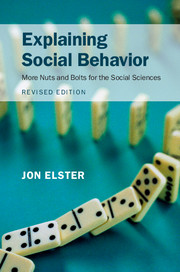Book contents
- Frontmatter
- Dedication
- Contents
- Preface
- I Explanation and Mechanisms
- II The Mind
- III Action
- 10 Constraints: opportunities and abilities
- 11 Reinforcement and selection
- 12 Persons and situations
- 13 Rational choice
- 14 Rationality and behavior
- 15 Responding to irrationality
- 16 Implications for textual interpretation
- IV Interaction
- Conclusion: is social science possible?
- Index
15 - Responding to irrationality
from III - Action
Published online by Cambridge University Press: 05 August 2015
- Frontmatter
- Dedication
- Contents
- Preface
- I Explanation and Mechanisms
- II The Mind
- III Action
- 10 Constraints: opportunities and abilities
- 11 Reinforcement and selection
- 12 Persons and situations
- 13 Rational choice
- 14 Rationality and behavior
- 15 Responding to irrationality
- 16 Implications for textual interpretation
- IV Interaction
- Conclusion: is social science possible?
- Index
Summary
Second-best rationality
In the last two chapters I have considered the ideal of rational behavior and the frequent lapses from rationality. These lapses, however widespread and frequent, are not inevitable. If we understand our propensity to make mistakes, we can and do take precautions to make ourselves less likely to make them again, or at least limit the damage if we do. As I have said repeatedly, we want to be rational. We may think of these precautionary strategies as a form of imperfect or second-best rationality. They should be distinguished from simple learning, which occurs when the propensity simply fades away as a result of improved insight. It has been reported, for instance, that when people realize that voting is, in one sense, pointless, they are less likely to vote. Cognitive fallacies that are akin to optical illusions can also be overcome by learning. Just as we learn to ignore the appearance of a stick that looks broken in water, some gamblers presumably learn the hard way that the dice have no memory. I am concerned here, however, with propensities that persist over time.
To cope with our tendencies to behave irrationally, we may use either intrapsychic strategies or extrapsychic devices (precommitment). I shall first illustrate how these techniques are used to counteract hyperbolic discounting and the inconsistent behavior it generates, and then discuss their use to control emotional and addictive behavior. These various strategies are not necessarily rational, but many of them are.
Future selves as allies
An agent who is subject to hyperbolic discounting and knows it is sophisticated. Unlike the naive agent who finds himself changing his mind over and over again without understanding the underlying mechanism, the sophisticated agent both is aware of her propensity and deplores it. Anticipating future situations in which she will face the choice between an early small reward and a delayed larger reward, she would like to make herself choose the latter despite her propensity to choose the former. In some cases, she may treat her “future selves” as allies in a common effort to overcome temptations. In other cases, she may treat them as adversaries and try to limit the damage they can do to her “present self.” This language, to be sure, is metaphorical, but it will be demetaphorized.
- Type
- Chapter
- Information
- Explaining Social BehaviorMore Nuts and Bolts for the Social Sciences, pp. 270 - 282Publisher: Cambridge University PressPrint publication year: 2015



